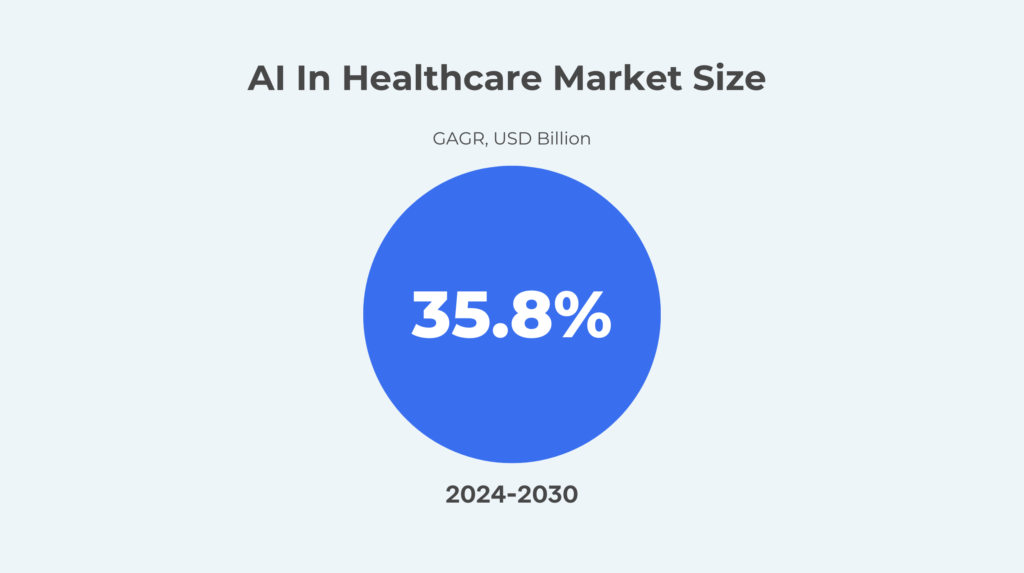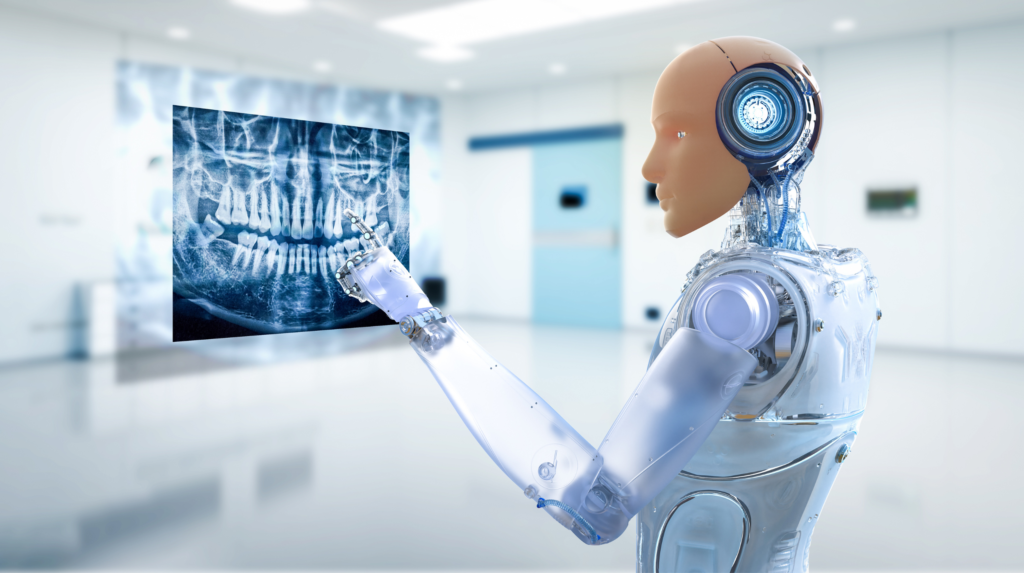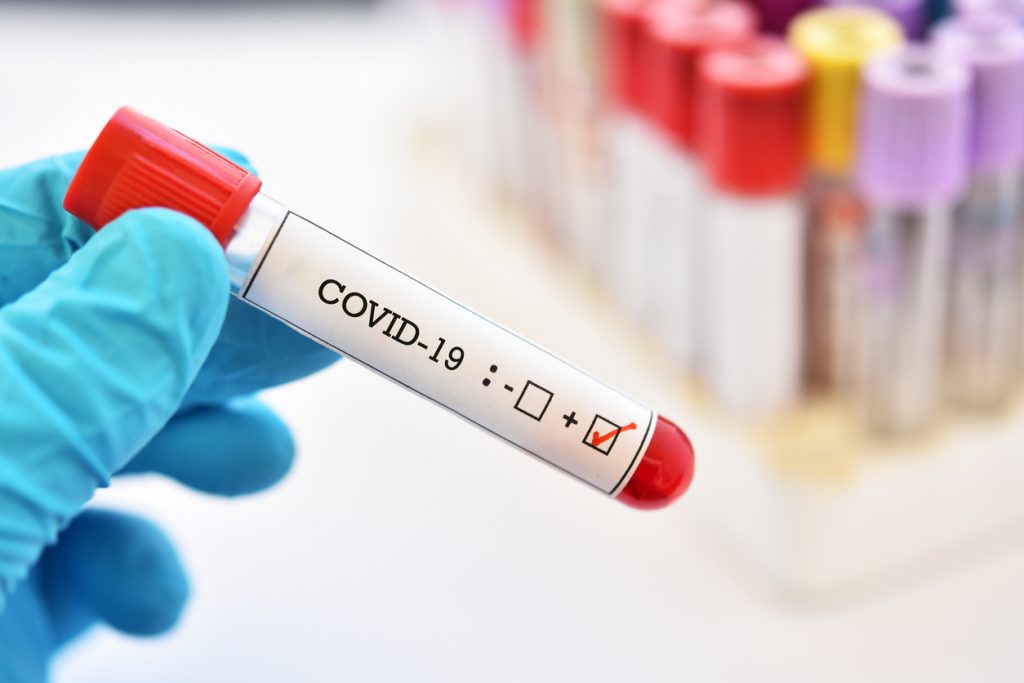In recent years, a significant shift in medicine has occurred. Recognizing that no two individuals are the same or have exactly the same problems, healthcare experts focus increasingly on personalized medicine. The traditional one-size-fits-all method was a thing of the past. By considering factors unique to each individual, doctors now prioritize creating personalized treatment plans tailored to their patients.
Integrating artificial intelligence (AI) in the field is already revolutionizing healthcare. The global healthcare market was estimated to be worth $19.27 billion in 2023, and a study by Grand View Research shows that it is slated to grow at a 38.5% compounded annual growth rate between 2024 and 2030.

With the increasing adoption of it, the future of AI personalized medicine is already here. AI technology can analyze, sort, and process vast quantities of data much faster than humans. Doing so helps healthcare providers get better and more insightful information to create personalized treatment plans.
What is Personalized Medicine?
Also called precision medicine, personalized medicine is an approach to healthcare in which doctors create treatment plans uniquely suited to individual patient profiles. In precision medicine, healthcare providers consider several factors regarding each patient to offer treatments and therapies specifically designed to help them.
Personalized Treatment Plans
One of the key elements of personalized medicine is the creation of tailored treatment plans. These plans are developed based on a comprehensive analysis of each patient’s unique characteristics, including genetic makeup, lifestyle, environment, and even specific biomarkers related to their condition.
Personalized treatment plans aim to move beyond the traditional one-size-fits-all model by addressing the unique needs and circumstances of each individual. This approach increases the likelihood of treatment success, reduces the chances of adverse reactions, and enhances the overall effectiveness of healthcare interventions.
For example, in oncology, personalized treatment plans might involve selecting the most appropriate chemotherapy or targeted therapy based on the genetic mutations present in a patient’s tumor. Similarly, in cardiology, treatment plans could be tailored based on a patient’s specific risk factors for heart disease, ensuring that interventions are effective and safe.
Traditional Medicine vs. Personalized Medicine
In the traditional approach, doctors would prescribe drugs and other therapies to patients designed to treat large groups of people with the same diseases. While doctors might consider weight, age, or sex, their overall approach is based on what will most likely work with everyone facing similar illnesses. Unfortunately, not everybody responds to each treatment the same way. Certain drugs might be more effective for some people but have harmful effects for others. When that happens, doctors rely on trial and error to pinpoint the exact treatment for each patient.
The Human Genome Project, completed in 2003, helped the healthcare industry better understand genetic variations and their impact on health and disease. It also helped healthcare experts understand the need to provide treatments that consider more factors.
With precision medicine, doctors examine each patient’s genomic profile, environment, lifestyle, and basic factors. They consider the characteristics of the illness to identify the most suitable treatment.
The Need for Artificial Intelligence in Personalized Medicine
If you’re wondering, “How does AI contribute to personalized medicine and treatment plans?” The answer is quite simple.
Collecting, analyzing, and interpreting large quantities of data is necessary for understanding how different patients will respond to patients. From genetic information to lifestyle data, electronic health records, and more, manually analyzing all the data takes too much time and leaves room for inaccuracies.
AI algorithms can process vast datasets more precisely and much faster. By leveraging artificial intelligence in personalized medicine, healthcare providers can create more timely and effective treatment plans with fewer side effects and improve outcomes.
How AI Will Transform Doctors’ Approach to Treatment
Traditionally, doctors make treatment decisions based on generalized guidelines that apply to broad patient populations. While it works effectively a lot of the time, each patient’s unique circumstances might make a difference in how effective a treatment might be for them. The result is a degree of trial and error and a slightly greater risk to some patients, especially if they face severe health conditions.
AI is transforming how doctors approach treatment plans by helping them make well-informed decisions. AI helps doctors make more data-driven and individualized treatment plans for patients. AI models in healthcare can analyze patient genomic data, medical history, and lifestyle factors to predict how they might respond to various treatments. This predictive ability can help doctors identify the most effective therapies, minimizing trial and error, and significantly reducing the risk of adverse health outcomes.
AI will also enable continuous learning and adaptation in treatment plans. As AI systems analyze more patient data over time, they can identify patterns and refine their predictions, leading to increasingly accurate and personalized treatment recommendations. This shift from a reactive to a proactive approach means that doctors can anticipate and prevent potential complications before they arise, significantly improving patient outcomes.
Additionally, AI-powered tools will provide doctors with real-time insights during patient consultations, allowing them to make more informed decisions and adjust treatment plans on the fly, ensuring that each patient receives the best possible care.
The Use of AI to Improve Accuracy in Diagnostics for Personalized Medicine
A crucial element of AI personalized medicine is the ability to get far more accurate diagnoses than doing it manually. Traditional diagnostics rely heavily on professionals interpreting data from medical tests. Unfortunately, subjectivity, human error, and the inability to detect easily missable aspects of the test results can lead to problems.
For precision medicine, accurate diagnoses are critical. Here’s how AI can enhance how healthcare providers get diagnostic results:
- Efficient Medical Imaging Analytics: AI algorithms can analyze complex data from imaging tests like MRIs, CT scans, and X-rays with more speed and precision. Machine Learning models trained on vast historical data can assist specialists like radiologists in getting more accurate interpretations by comparing the data.
- Clinical Decision Support Systems: CDSS powered by AI can analyze vast medical datasets to provide healthcare professionals with evidence-based recommendations for personalized diagnostic and treatment option suggestions.
- Predictive Analytics: AI can determine the risk of developing various health conditions by analyzing patient data and comparing it to markers in historical healthcare data.
- Early Warning Systems and Real-Time Monitoring: Patient monitoring systems powered by AI can analyze patient data in real-time to alert healthcare professionals to any deviations indicating deterioration in a patient’s health or the onset of a condition through early warning systems.
How AI Personalized Treatment Planning Improves Health Outcomes for Patients
AI-enabled solutions can improve treatment planning in personalized medicine through several methods, including:
Offering Treatment Recommendations Tailored to Individual Patients
Doctors prescribe drugs and other therapies to patients based on what they know about their efficacies in treating large groups of people with similar diseases. Since every patient can respond differently to each treatment, some patients might not respond well to certain treatments.
AI-based algorithms eliminate guesswork and minimize the risk of adverse side effects by analyzing patient-specific data. These AI models compare data like medical history, lifestyle factors, and genetic information with treatment responses from patients with similar profiles. Doing so helps AI models identify more effective treatment plans with reduced risks of side effects. They help healthcare professionals get deeper insights into the best treatments possible for a patient based on how they might respond to treatments.
Assisting Doctors in Optimizing Treatment Methods
Doctors optimize the treatment plan for each patient based on how they respond to different drugs and therapies during treatment. Healthcare professionals have to consider various factors to make these decisions. Since they deal with several patients during the day, they have to be quick on their feet with decisions, which sometimes can lead to inaccuracies.
AI models trained to help them can assess various treatment options and recommend the most appropriate course of action based on the changing factors. AI can help determine the best time to administer a particular therapy or adjust dosages based on real-time patient responses, ensuring the highest level of care with minimal risk. This way, healthcare professionals have far better data to make well-informed decisions regarding patient care.
Monitoring the Progress of Patient Treatment
Typically, nurses and doctors track a patient’s recovery by collecting data from wearable devices, EHRs, and patient responses to make any necessary adjustments in treatment plans. However, collecting and interpreting a lot of data is time-consuming and prone to human error.
Patient monitoring systems powered by AI can provide healthcare professionals with valuable insights into the effectiveness of the chosen treatment plan by monitoring, analyzing, and interpreting patient data. The real-time feedback helps healthcare providers make timely adjustments to treatment plans and improve patient outcomes.
Enabling Better Collaboration Between Various Specialties
Depending on the severity of a patient’s health concerns and condition, healthcare providers across multiple specialties might be treating them. Since one aspect of a patient’s condition can impact others that another specialist might need to cater to, doctors in different disciplines must collaborate with each other to improve health outcomes. Due to conflicting or busy schedules, teams from different disciplines might have gaps in communication that can put a patient at risk of complications.
AI-powered systems can streamline collaboration between specialists across disciplines in a hospital setting. AI models trained for this can make information sharing, communication, and coordinating decision-making seamless. This can ensure all specialists are on the same page and make informed decisions together.
What Are the Challenges of Using AI in Personalized Medicine?
As with any major change in approach, integrating AI for personalized medicine and treatment plans also faces a few challenges that experts are addressing. Knowing what they are can help you understand what to expect when working with specialists to create a customized AI-powered solution to assist in personalized medicine.
The Possibility of Bias
AI models require training by utilizing data made available to them to assist with precision medicine. AI models trained on limited and biased data might not make favorable recommendations toward patients whose demographical data they were not trained with. The bias from data and evidence-based on large groups of people can cause bias in AI responses. Fortunately, coordinated efforts from the healthcare sector to train AI models with comprehensive and diverse datasets can easily address the problem.
Data Privacy and Security
Ensuring patient data privacy is a major factor for the healthcare sector. This information is highly sensitive, and organizations are liable to protect the data from unauthorized access and breaches. AI systems require vast amounts of data to function effectively, which means that large datasets, including personal health information, are often stored and processed. Ensuring that this data is encrypted, anonymized, and stored securely is essential to protect patient privacy. Additionally, providers must comply with standards set by regulations like HIPAA. Solid cybersecurity measures and training staff to prevent data breaches are necessary.
AI-Specific Regulatory Hurdles
Regulatory bodies such as the Food and Drug Administration (FDA) in the United States are responsible for ensuring that AI-based medical devices and systems are safe and effective. However, the regulatory framework for AI in healthcare is still taking shape, and there are often uncertainties about the requirements and approval processes. Developers and healthcare providers must stay informed about the latest regulatory guidelines and work closely with regulatory bodies to ensure compliance. This can be a time-consuming and complex process, but it is essential for ensuring that AI systems are safe and effective for patient care.
Future Trends in Personalized Treatment Plans and AI
While it has its challenges, AI in personalized medicine and treatment plans has far more benefits. As the technology and legal frameworks develop further, the future looks even brighter. Some of the trends regarding future trends with AI in personalized medicine include:
- Seamless Multimodal Data Integration: Improvements in the ability to assimilate and process vast quantities of data from various sources to continue improving results.
- Explainable AI: Explainable AI algorithms are being developed to provide transparent explanations of how AI models come to conclusions regarding their recommendations, making it easier for doctors to trust them.
- Easier Healthcare Access: By streamlining healthcare operations, AI can make it easier for underserved populations to access good healthcare.
- Advanced Genomic Medicine: AI can continue the work from the Human Genome Project to help the healthcare industry gain even more meaningful insights on treatments based on unique genetic patient profiles.
The future of healthcare is unfolding right now. Improving health outcomes, reducing the burden on healthcare systems, and making communities healthier are crucial goals. AI in personalized medicine and treatment plans is the key to achieving it.
How Can I Get AI Started?
From creating AI-powered solutions for personalized medicine and treatment plans to platforms that streamline hospital operations, Achievion Solutions is already creating AI-powered tailor-made solutions for healthcare professionals to enhance their practices with excellent results across various areas. If you’re ready to transform healthcare with a powerful platform and advanced AI solutions that drive personalized medicine and optimize business processes, contact Achievion today to discover how we can elevate your capabilities and patient outcomes.









